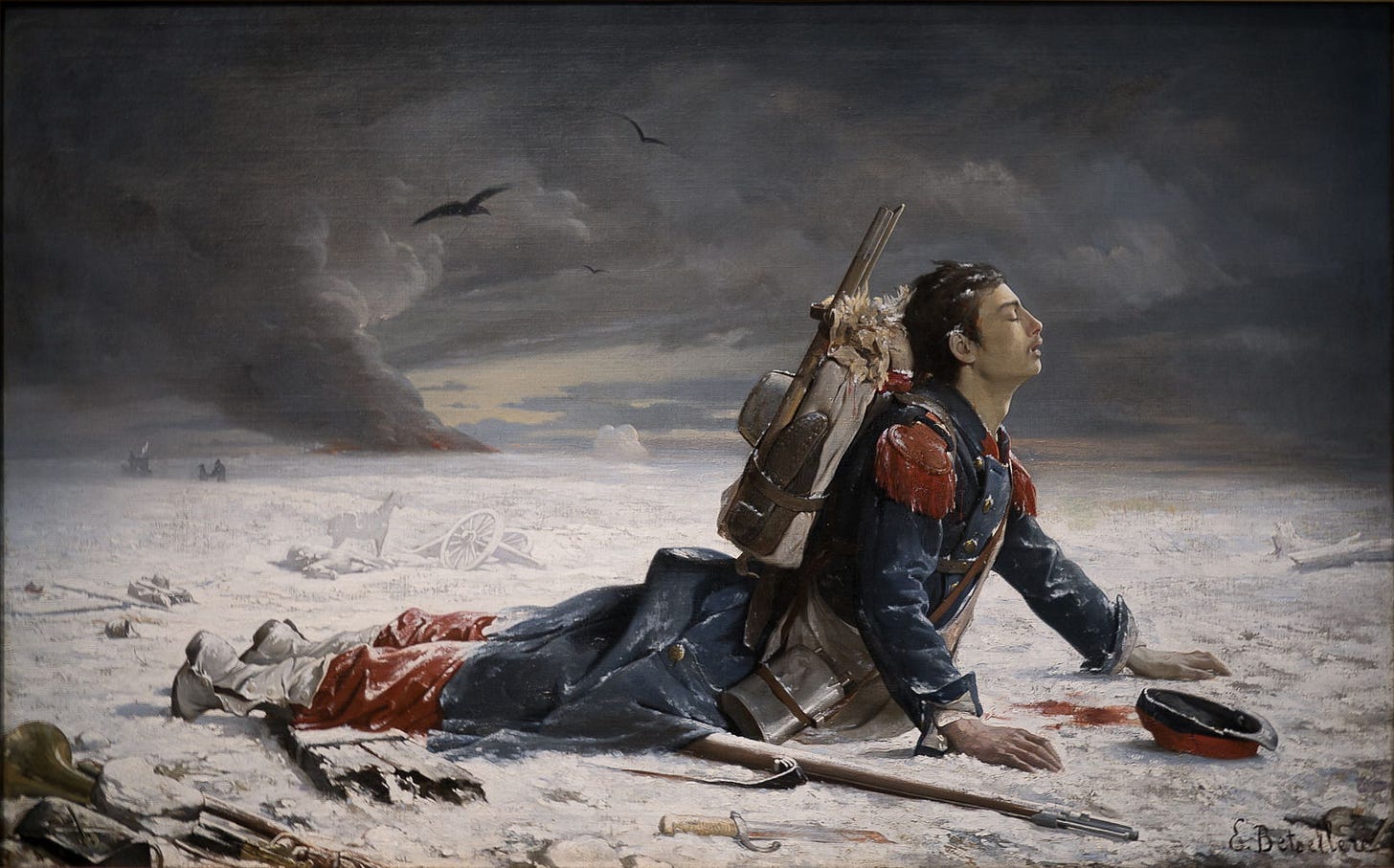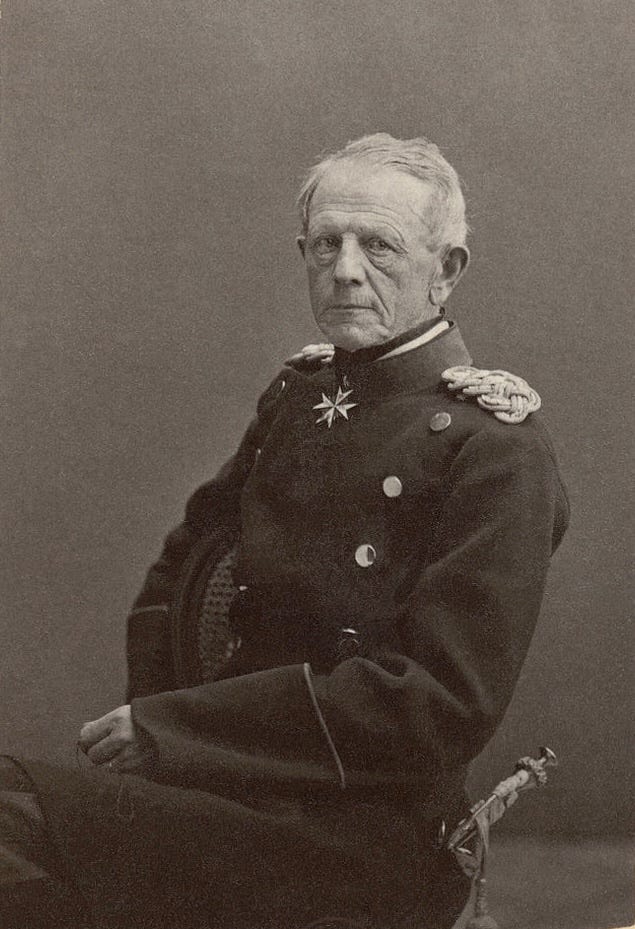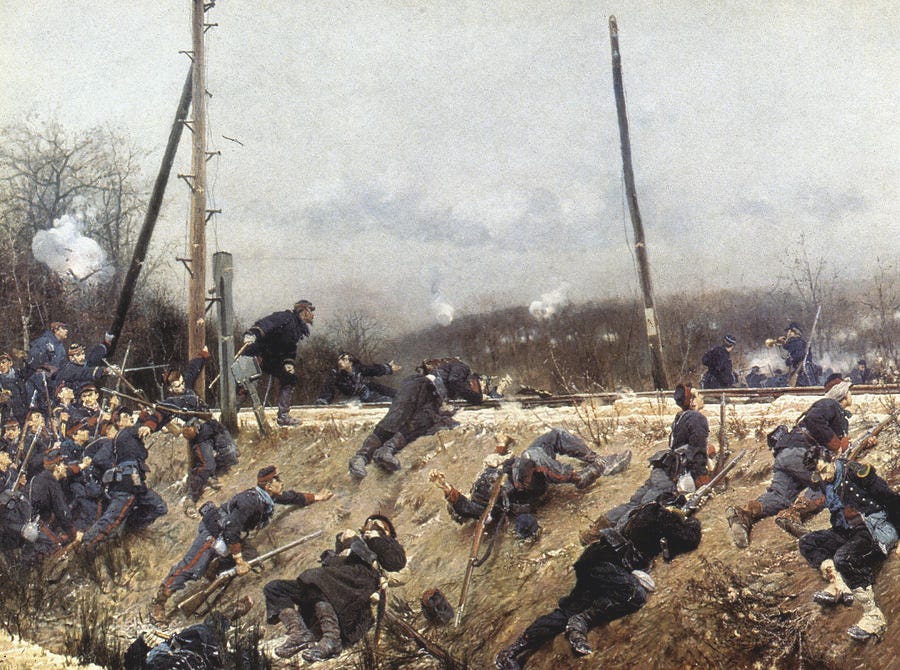The century intervening from the fall of Napoleon in 1815 to the beginning of the First World War in 1914 is usually regarded as a sort of golden age for Prusso-German militarism. In this period, the Prussian military establishment won a series of spectacular victories over Austria and France, establishing an aura of German military supremacy and realizing the dream of a unified Germany through force of arms. Prussia in this era also produced three of history’s iconic military personalities - Carl von Clausewitz (a theoretician), Helmuth von Moltke (a practitioner), and Hans Delburk (a historian).
As the story usually goes, this century of victory and excellence created a sense of hubris and militarism in the Prusso-German establishment which led the country to march impetuously to war in the August of 1914, only to founder in a terrible war in which new technologies frustrated its idealized approach to warmaking. Pride, as they say, goes before the fall.
This is an interesting and satisfying story, which posits a rather traditional hubris-downfall cycle. To be sure, there is an element of truth to it, as there were many elements of German leadership which possessed an unseemly degree of overconfidence. However, this was far from the only emotion. There were also many prominent pre-war German thinkers who professed fear, anxiety, and unmitigated dread. They had valuable ideas to teach their colleagues - and perhaps us.
Let’s go back, all the way to 1870, to the Franco-Prussian War.
This conflict is generally considered the magnum opus of the titanic Prussian commander, Field Marshal Helmuth von Moltke. Exercising deft operational control and an uncanny sense of intuition, Moltke orchestrated an aggressive opening campaign which sent Prusso-German armies streaming like a mass of tentacles into France, trapping the primary French field army in the fortress of Metz in the opening weeks of the war and besieging it. When the French Emperor, Napoleon III, marched out with a relief army (comprising the rest of France’s battle-worthy formations), Moltke hunted that army down as well, encircling it at Sedan and taking the entire force (and the emperor) into captivity.
From an operational perspective, this sequence of events was (and is) considered a masterclass, and a major reason why Moltke has become revered as one of history’s truly great talents (he is on this writer’s Mount Rushmore alongside Hannibal, Napoleon, and Manstein). The Prussians had executed their platonic ideal of warfare - the encirclement of the main enemy body - not once, but twice in a matter of weeks. In the conventional narrative, these great encirclements became the archetype of the German kesselschlacht, or encirclement battle, which became the ultimate goal of all operations. In a certain sense, the German military establishment spent the next half-century dreaming of ways to replicate its victory at Sedan.
This story is true, to a certain extent. My objective here is not to “bust myths” about blitzkrieg or any such trite thing. However, not everyone in the German military establishment looked at the Franco-Prussian War as an ideal. Many were terrified by what happened after Sedan.
By all rights, Moltke’s masterpiece at Sedan should have ended the war. The French had lost both of their trained field armies and their head of state, and ought to have given in to Prussia’s demand (namely, the annexation of the Alsace-Lorraine region).
Instead, Napoleon III’s government was overthrown and a National Government was declared in Paris, which promptly declared what amounted to a total war. The new government abandoned Paris, declared a Levee en Masse - a callback to the wars of the French Revolution in which all men aged 21 to 40 were to be called to arms. Regional governments ordered the destruction of bridges, roads, railways, and telegraphs to deny their use to the Prussians.
Instead of bringing France to its knees, the Prussians found a rapidly mobilizing nation which was determined to fight to the death. The mobilization prowess of the emergency French government was astonishing: by February, 1871, they had raised and armed more than 900,000 men.
Fortunately for the Prussians, this never became a genuine military emergency. The newly raised French units suffered from poor equipment and poor training (particularly because most of France’s trained officers had been captured in the opening campaign). The new mass French armies had poor combat effectiveness, and Moltke managed to coordinate the capture of Paris alongside a campaign which saw Prussian forces marching all over France to run down and destroy the elements of the new French Army.
Crisis averted, war won. All was cozy in Berlin, it would seem?
Far from it. While many were content to shake hands and congratulate each other on a job well done, others saw something horrifying in the second half of the war, and the French mobilization program. Surprisingly, Moltke himself was among this party.
Moltke viewed the ideal form of war as something which the Germans call a Kabinettskriege. Literally a Cabinet War, this referred to the limited wars which dominated affairs for much of the 16th through 19th centuries. The particular form of these wars was a conflict between the professional militaries of states and their aristocratic leadership - no mass levies, no horrible scorched earth, no nationalism or mass patriotism. For Moltke, his earlier war against Austria was an ideal example of a Cabinet War: the Prussian and Austrian professional armies fought a battle, the Prussians won, and the Austrians agreed to Prussia’s demands. There was no declaration of a blood feud or a guerilla war, but instead a vaguely chivalrous acknowledgment of defeat and limited concessions.
What happened in France, in contrast, was a war which began as a Kabinettskriege and devolved into a Volkskriege - a people’s war, and thus had brought into question the entire concept of the limited Cabinet War altogether. As Moltke put it:
The days are gone by when, for dynastic ends, small armies of professional soldiers went to war to conquer a city, or a province, and then sought winter quarters or made peace. The wars of the present day call whole nations to arms…
As Moltke saw it, the only solution to a Volkskriege was to respond with a “War of Extermination.” Now at this, many will no doubt bristle, but Moltke was unequivocally not suggesting genocide. He meant something closer to the destruction of the French resource base - dismantling the state, destroying its material wealth, and arranging its affairs. In essence, he called for something like what Germany imposed on France in 1940 - Hitler did not try to annihilate the French population, but neither did he simply take a few territories and walk away. Instead, France as an independent state was steamrolled.
Moltke argued in 1870-71 that pursuing limited war aims against France no longer made sense, since the entire French nation was now aroused in anger at Prussia-Germany. The French, he argued, would never forgive Prussia for taking the Alsace region, and would become intractable enemies. Therefore, France had to be leveled as a military-political entity or else it would simply rise again and become a dangerous enemy very soon. Unfortunately for Moltke, the Prussian Chancellor, Otto von Bismarck, wanted a fast resolution to the war and was not interested in trying to occupy and humiliate France. He told Moltke to hunt down the new French army and get it over with, so Moltke did.
However, Moltke’s basic fear - that a limited war would do no lasting damage to France as a threat - proved true. It took only a few years for the French to completely rebuild their military - by 1875, Moltke and his staff estimated that the window of opportunity was closed and France was fully prepared to fight another war.
Meanwhile, from a military perspective, there were many in the Prussian establishment who were terrified by France’s success mobilizing an emergency army. Prussia’s victory, they argued, was possible only because the French mobilization had been improvised - lacking weapons and training. A nation that was prepared to mobilize and arm millions of men in repetitive conscriptions, with the requisite logistics and training infrastructure, might be nearly impossible to defeat, they argued, and put the entire framework of Prussian war-making in question.
The idea was so important that Moltke dedicated much of his final pre-retirement speech to the Reichstag to the topic. As he put it on that oft-quoted occasion:
The age of Kabinettskriege is behind us - all we have now is Volkskrieg, and any prudent government will hesitate to bring about a war of this nature with all its incaluclable consequences… If war should break out… no one can estimate its duration or see when it will end. The greatest powers of Europe, which are armed as never before, will fight each other. None can be annihilated so completely in one or two campaigns that it would declare itself vanquished and be compelled to accept hard conditions for peace.
Such a statement seems to, and indeed does run contrary to the perception of Germany as overconfident and belligerent, and to the idea that all were taken aback by the length and savagery of the world war. In fact, Germany’s most revered prewar practitioner explicitly predicted a gruesome, totalizing, and lengthy war.
Other members of Moltke’s staff pontificated more explicitly on the threat of people’s war, or total war. Field Marshal Colmar von der Goltz was the most prolific of these, and wrote extensively on the French mobilization project, arguing that the French could have easily swamped the Germans if they had possessed the capacity to properly train and supply their new armies. His general thesis was that future wars would necessarily involve the whole resources of the state, and Germany ought to lay the groundwork to train and sustain mass armies for years of conflict.
In the years leading up to World War One, a minority wing of the German establishment arose which was remarkably clearsighted about the coming conflict, and argued that it would be won via total strategic attrition, with the full resources of the battling nations mobilized over many years. Functionally, the German military apparatus became split between a preeminent majority which looked to the first half of the Franco-Prussian War (with Moltke’s massive victories) as the model, and a less prominent but vocal minority which dreaded the portents of France’s national mobilization and feared a future of “people’s war.”
All of that is endlessly interesting to the aficionados of military history and the disciples of mankind’s bloody record of war-making. What is interesting for our purposes, however, is the argument between Moltke and Bismarck in the waning months of 1870. Moltke saw clearly that France’s patriotic animosity had been aroused and believed that a limited war would be counterproductive, in that it would fail to substantively weaken France in the long run, leaving an intact and vengeful enemy. This calculation proved essentially correct, and France was able to provision a powerful war effort in the world war. In contrast, Bismarck favored a limited war with limited aims, commensurate with the political situation at home. It is not an exaggeration to say that the decision to favor domestic political conditions over long-term strategic calculations cost Germany its chance at world power and led to defeat in the world wars.
Obviously what I have woven for you here is thinly veiled historical analogy.
Russia began a Kabinettskriege in 2022 when it invaded Ukraine, and found itself mired in something closer to a Volkskriege. Russia’s mode of operation and war aims would have been instantly recognizable to a 17th Century statesman - the Russian professional army attempted to defeat the Ukrainian professional army and achieve limited territorial gains (the Donbas and recognition of Crimea’s legal status). They called this a “special military operation.”
Instead, the Ukrainian state has decided - like the French National Government - to fight to the death. To Bismarck’s demands for Alace-Lorraine, the French simply said “there can be no reply but Guerre a Outrance” - war to the utmost. Putin’s cabinet war - limited war for limited aims - exploded into a national war.
Unlike Bismarck, however, Putin has opted to see Ukraine’s raise. My suggestion - and it is only that - is that Putin’s dual decisions in the autumn of last year to announce a mobilization and to annex the disputed Ukrainian territories amounted to a tacit agreement to Ukraine’s Volkskrieg.
In the debate between Moltke and Bismarck, Putin has chosen to follow Moltke’s lead, and wage the war of extermination. Not - and again we stress this - a war of genocide, but a war which will destroy Ukraine as a strategically potent entity. Already the seeds are sown and the fruit begins to bud - a Ukrainian democide, achieved through battlefield attrition and the mass exodus of prime age civilians, an economy in shambles and a state that is cannibalizing itself as it reaches the limits of its resources.
There is a model for this - ironically, Germany itself. After the Second World War, it was decided that Germany - now held to account for two terrible conflagrations - could simply not be allowed to persist as a geopolitical entity. In 1945, after Hitler shot himself, the allies did not demand the spoils of a Cabinet War. There was no minor annexation here, no redrawn border there. Instead, Germany was annihilated. Her lands were divided, her self-governance was abolished. Her people lingered on in a stygian exhaustion, their political form and life now a plaything of the victor - precisely what Moltke wanted to do to France.
Putin is not going to leave a geostrategically intact Ukraine which will seek to retake the Donbas and exact revenge, or become a potent forward base for NATO. Instead, he will transform Ukraine into a Trashcanistan that can never wage a war of revanchism.
Clausewitz warned us. He too wrote of the danger of a people’s war. He spoke of the French revolution thus:
Now war stepped forth in all its raw violence.
War was returned to the people who to some extant had been separated from it by professional armies; war cast off its shackles and crossed the bounds of what had once seemed possible.







As he reliably does, Serge has structured a historically accurate explanation of Von Moltke's war and his angst about the way it evolved into Volkskrieg elucidated in his Reichstag summation. He is further solidly correct in his analysis of Putin's intent and purpose in finally acting in Ukraine. Where I take some issue with him is in his inference about Putin's intention with the SMO. Putin's strategy was sound and achievable against Ukraine; just not against a Ukraine funded and fully supported by The Empire and its clumsy toy, NATO. If Putin can be strategically faulted it has to be because he could not believe the U.S., in its vicious determination to do anything short of actual commitment to engage itself, would go all in and back the Ukronazis with endless arms and money. That is all that frustrated the kabinettkrieg Putin foresaw, and it has kept an insane Ukraine still fighting to the last Ukrainian for the gratification of doddering, impotent, old Aunt Sam.
A valuable commentary and description of the war Russia is now waging.
However, labeling this conflict as a "peoples' war" by Ukraine is a stretch. The Ukrainian people are certainly being exploited and destroyed but it is through control by the tribe in Kiev, Wall Street and its control over the US government and European governments, all of whose resources are being used to march the people to their deaths.